Introduction
As the digital marketplace continues to evolve, the integration of AI-powered chatbots has emerged as a game-changer for e-commerce. These intelligent tools not only provide personalized shopping experiences but also address the growing demand for immediate customer support. With the ability to analyze user data and behavior, chatbots craft tailored product recommendations that enhance engagement and drive conversions.
However, the journey is not without its challenges; businesses must navigate customer frustrations and ensure seamless transitions to human agents when necessary. This article delves into the transformative impact of chatbot technology on the shopping experience, exploring successful implementations and the innovative strategies that are reshaping how retailers connect with their customers. Through a closer look at case studies and expert insights, it becomes evident that embracing these advancements is essential for businesses seeking to thrive in today's competitive e-commerce landscape.
The Rise of Chatbot-Driven Personalized Shopping Guides
In recent years, online retail has undergone a profound transformation, largely due to the advent of AI-powered personalized shopping guides and chatbot-driven tools. With over 20 years of unmatched expertise, our tailored e-commerce solutions have a proven track record of significantly improving critical KPIs for our clients, enhancing retention rates, boosting Average Order Value (AOV), and increasing Lifetime Value (LTV). These AI tools have become essential for retailers, addressing the increasing consumer demand for convenience and personalized interactions. Chatbots engage users in real-time, offering tailored product recommendations, addressing inquiries, and facilitating smoother transactions. They also build community value by creating products that resonate with users' needs.
However, challenges persist; for instance, 54 percent of clients express frustration about the numerous questions asked before reaching a human agent. To address this, Gianna Maderis, Principal Customer Experience Manager, emphasizes the importance of utilizing collected personal data to enhance client experiences, stating, 'Clients understand that bots collect personal data but want them to use it to create a better experience.'
To mitigate frustrations, many companies are now implementing strategies that ensure seamless handoffs to human agents. For example, brands like Sephora and H&M have successfully incorporated virtual assistants that not only help with client inquiries but also facilitate smooth transitions to human support when necessary, thereby enhancing community value.
The newest developments in online retail conversational agents involve enhancements in natural language processing and machine learning algorithms that improve their capacity to comprehend and anticipate client requirements. We are dedicated to assisting businesses in transforming their online sales strategies, ensuring a future where chatbots not only enhance user interaction but also simplify the purchasing process, making it more effective and enjoyable for customers.
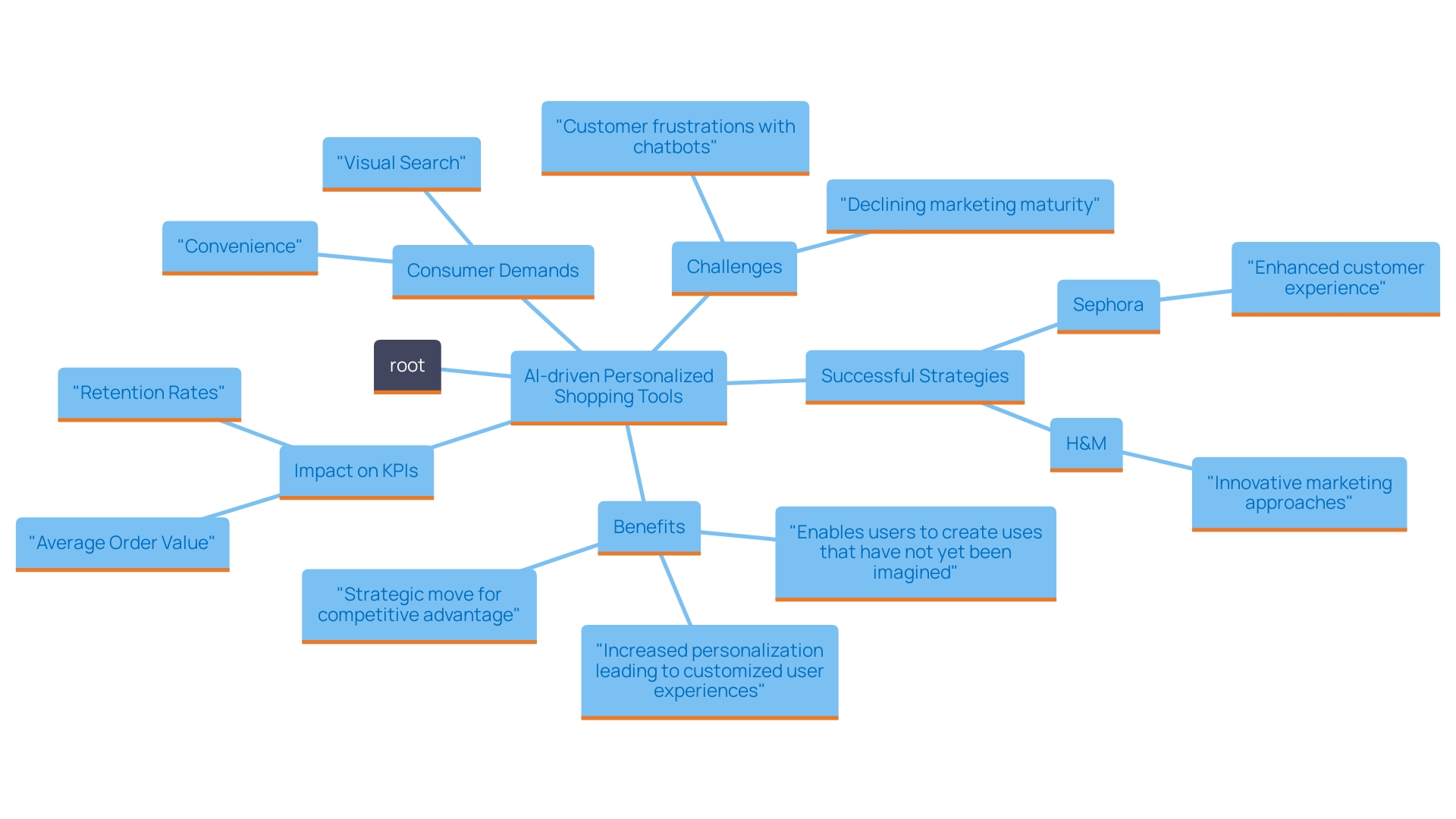
Personalized Product Recommendations: Tailoring the Shopping Experience
Chatbots have proven to be remarkably effective in delivering personalized product recommendations by leveraging advanced algorithms that analyze user data and behavior. These algorithms assess various factors, including past purchases, browsing history, and stated preferences, to suggest products likely to resonate with individual shoppers. According to a McKinsey Report, a significant 35% of purchases on Amazon are influenced by product recommendation algorithms, underscoring their impact on consumer behavior.
For instance, a chatbot might analyze a user's shopping cart and recommend complementary products, creating valuable upselling opportunities. This personalized method not only enhances the overall shopping journey but also significantly boosts conversion rates. A notable example is Sephora's chatbot, which has successfully increased conversion rates by providing tailored product suggestions based on user interactions. In a case study with OpenCart, the integration of AI tools for personalized recommendations led to improved online shopping performance by suggesting relevant products based on user preferences.
Recent advancements in AI algorithms, such as deep learning and reinforcement learning, have further improved virtual assistants' abilities in personalizing shopping interactions. Sven Henkel, a Senior Professor of Customer Behavior and Sales, emphasizes the importance of these innovations, noting that effective marketing communication and brand management are crucial in today's competitive e-commerce landscape. By utilizing user data intelligently, chatbots can offer highly customized shopping interactions that meet the unique needs and preferences of each individual, ultimately driving higher conversion rates and satisfaction.
Furthermore, by aligning these tailored interactions with community values, businesses can enhance client retention rates and cultivate long-term loyalty. With over 20 years of experience, our customized online retail solutions not only enhance key performance indicators, such as retention rates and Average Order Value (AOV), but also aid in building community value by creating products that align with your internal goals.
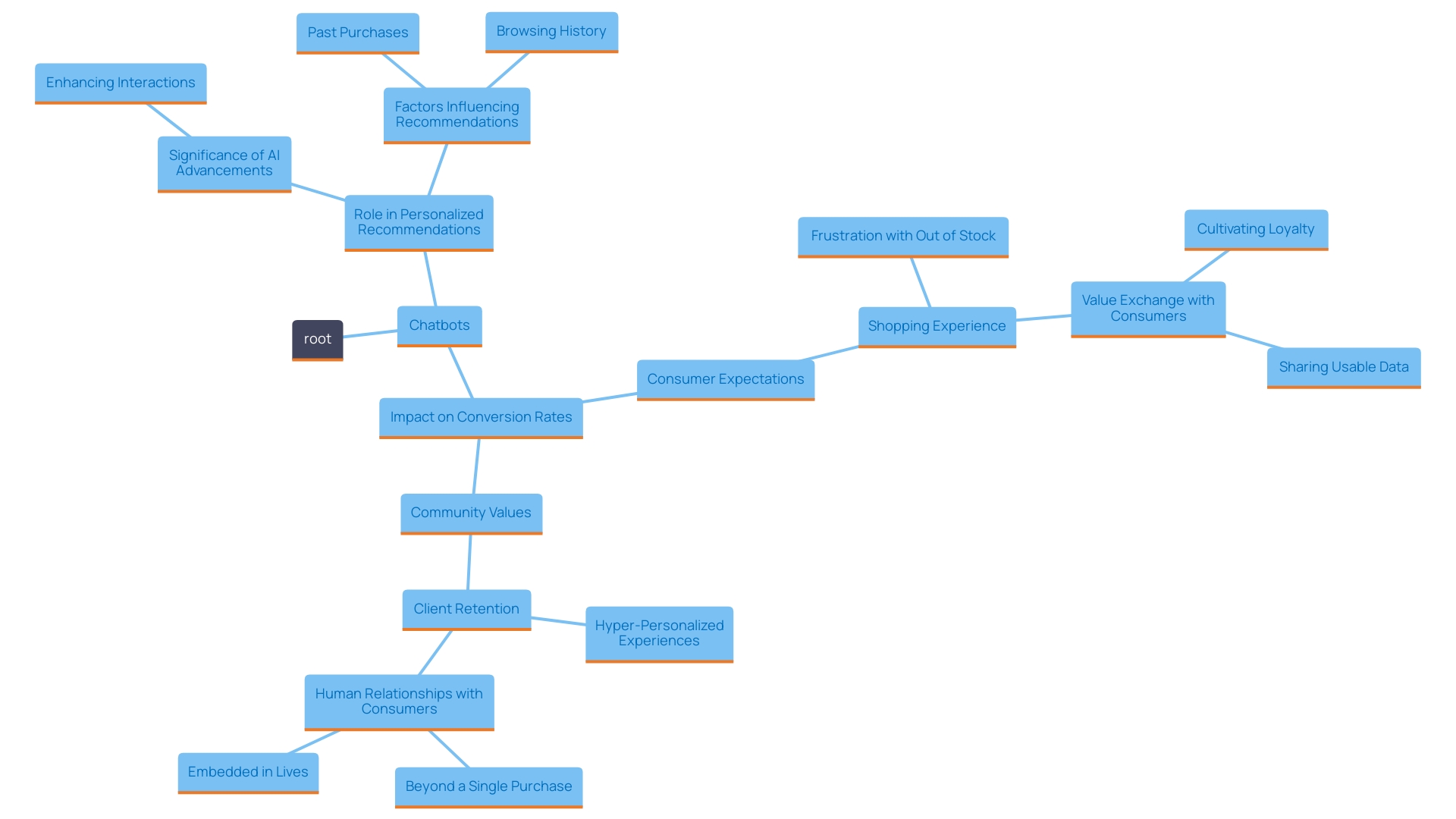
Always-On Customer Support: Enhancing Accessibility and Satisfaction
The introduction of automated assistants in e-commerce has transformed support services by offering 24/7 help. In a landscape where immediate responses are critical, chatbots excel at handling frequent inquiries and resolving common issues at any hour. This constant availability not only enhances satisfaction but also lightens the load on human support teams, enabling them to address more intricate problems. Our tailored e-commerce solutions have a proven track record of enhancing retention rates and boosting key performance indicators (KPIs) for businesses, demonstrating the significant impact of such technologies.
Recent studies indicate a significant rise in customer satisfaction with automated interactions, with statistics showing that up to 75% of customers express satisfaction when using AI systems for support. For instance, the IBM watsonx™ Assistant stands out as an enterprise-grade AI-powered platform that seamlessly integrates with various business tools, showcasing the advanced capabilities of contemporary conversational agents. Through our 20+ years of unmatched expertise, we have developed solutions that align directly with community goals and enhance value for businesses across multiple sectors.
A compelling case study in the real estate sector illustrates the effectiveness of automated conversation agents. By gathering client requirements and scheduling appointments, these AI assistants foster deeper relationships and enhance service delivery. This example highlights the broader potential of chatbots in online retail, where they can significantly enhance the shopping process and strengthen client relationships.
In conclusion, embracing always-on support not only boosts satisfaction but also has a tangible impact on e-commerce sales. Retailers who utilize these AI solutions can anticipate greater customer loyalty, a more efficient service delivery process, and a notable improvement in overall customer satisfaction, ultimately fostering community value and revenue growth.
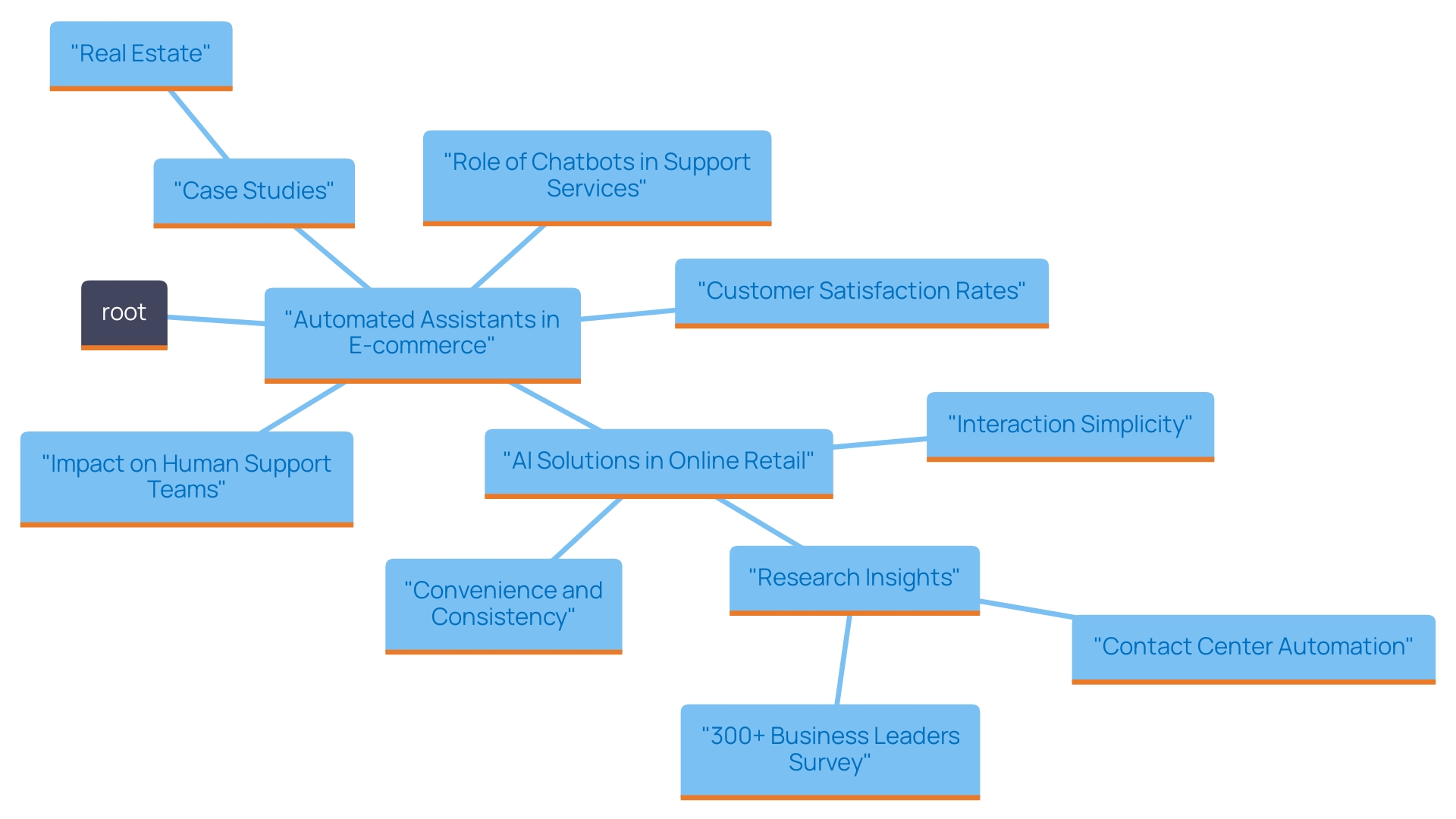
Leveraging Data Insights for Enhanced User Experience
Chatbots equipped with advanced analytics are revolutionizing personalized shopping encounters by leveraging data insights to tailor user interactions. Our solutions have a proven track record of significantly improving critical KPIs, helping businesses enhance retention rates and boost Average Order Value (AOV). The extensive surge of data produced today offers a wealth of opportunities for improving chatbot functionalities and enriching user interactions.
By meticulously analyzing client interactions, preferences, and feedback, businesses can optimize their chatbots to better anticipate and meet user needs. For example, if analytics show frequent questions about a specific product, the chatbot can be configured to provide detailed information and recommend related items, thereby improving the shopping process. Such customization not only enhances user satisfaction but also enables e-commerce businesses to refine their marketing strategies in alignment with consumer expectations.
Furthermore, the necessity of prioritizing user satisfaction cannot be overstated. Acquiring clients takes time, but losing them can occur in an instant, which emphasizes the significance of effective retention strategies. With more than 20 years of unmatched knowledge, our customized online retail solutions not only keep clients but also promote stronger connections, guaranteeing long-term success in the digital marketplace.
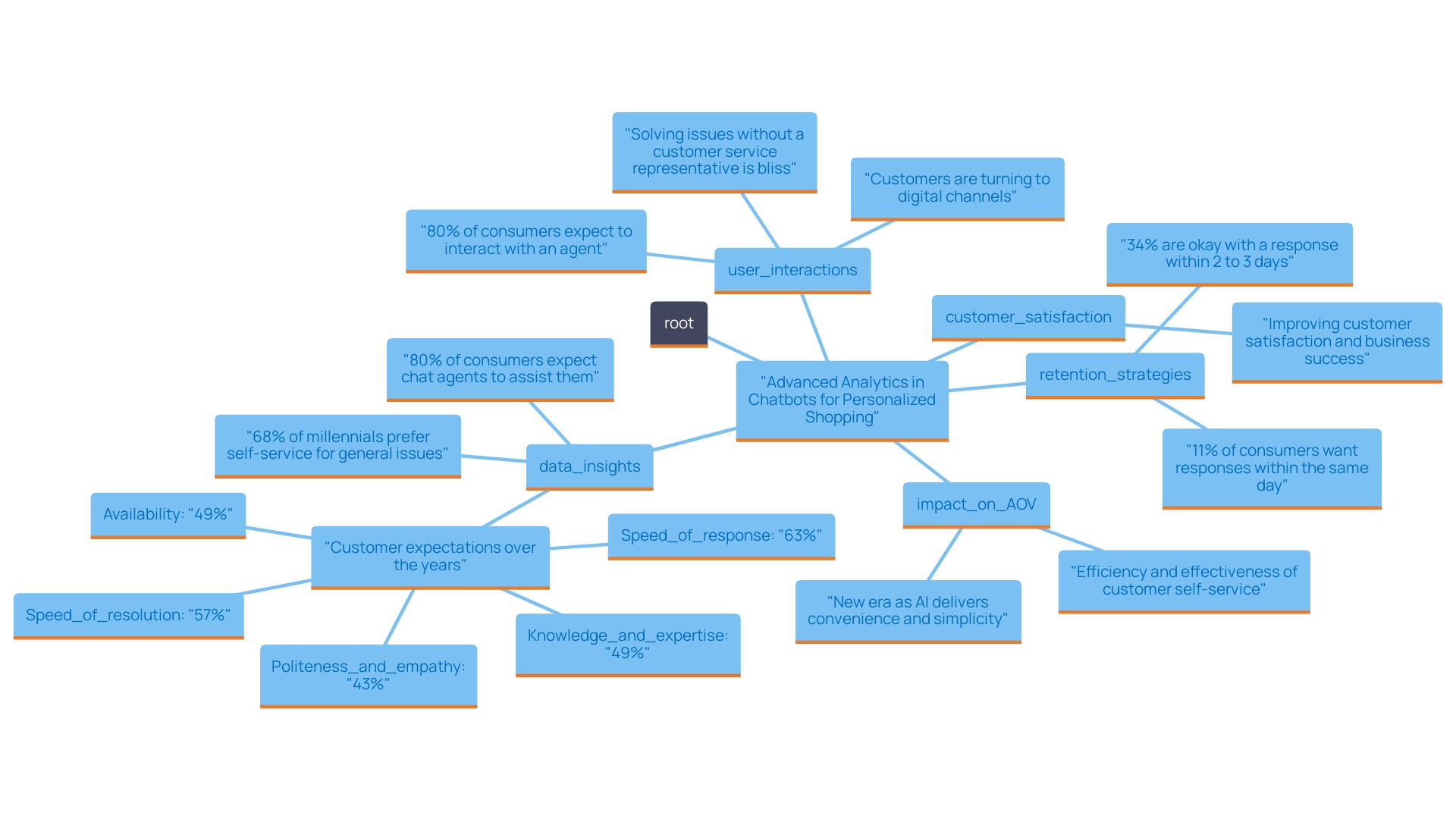
Case Studies: Successful Implementations of Chatbots in E-Commerce
Several prominent e-commerce brands have harnessed the power of chatbots to significantly elevate their shopping experiences, demonstrating the transformative potential of tailored e-commerce solutions. For over 20 years, our company has been at the forefront of these innovations, helping businesses enhance retention rates and boost Average Order Value (AOV). For instance, Sephora employs a sophisticated chatbot on both its website and mobile app, offering personalized product recommendations and beauty tips. This strategic integration has notably boosted client engagement and satisfaction, translating into higher sales figures, with studies showing that personalized interactions can increase conversion rates by up to 10%.
Similarly, H&M leverages chatbot technology to streamline the shopping process. Their chatbot helps clients by recommending clothing items according to their preferences and past purchases, creating a seamless and efficient shopping experience. These implementations not only enhance community value but also highlight the effectiveness of our tailored solutions, driving loyalty and revenue growth. In fact, brands that employ virtual assistants have experienced a rise in client retention rates by approximately 25%.
Expert insights further validate these successes. As Nicolas Fayon, CEO of Heek, aptly notes, 'Chatbots are already ever-present in various sectors, offering precision, automation, scalability, and efficiency.' This sentiment is echoed by the impressive capabilities of Video, which can automate up to 70% of common questions and recurring tasks, showcasing the efficiency and scalability of conversational AI.
Moreover, a detailed case study titled 'Will Chatbots Replace Humans?' explores the broader implications of chatbot adoption. While acknowledging the potential for job displacement, the study highlights the creation of more intellectually demanding roles, reflecting the dynamic nature of technological advancement. This is especially clear in the instances of Sephora and H&M, where automated assistants not only improve client engagement but also allow human staff to concentrate on more intricate tasks.
These examples and insights collectively illustrate the profound impact of automated conversational agents on the e-commerce landscape. By enhancing customer interactions and fostering business growth, chatbots align perfectly with our mission to build tailored solutions that reshape industries and create value for the community.
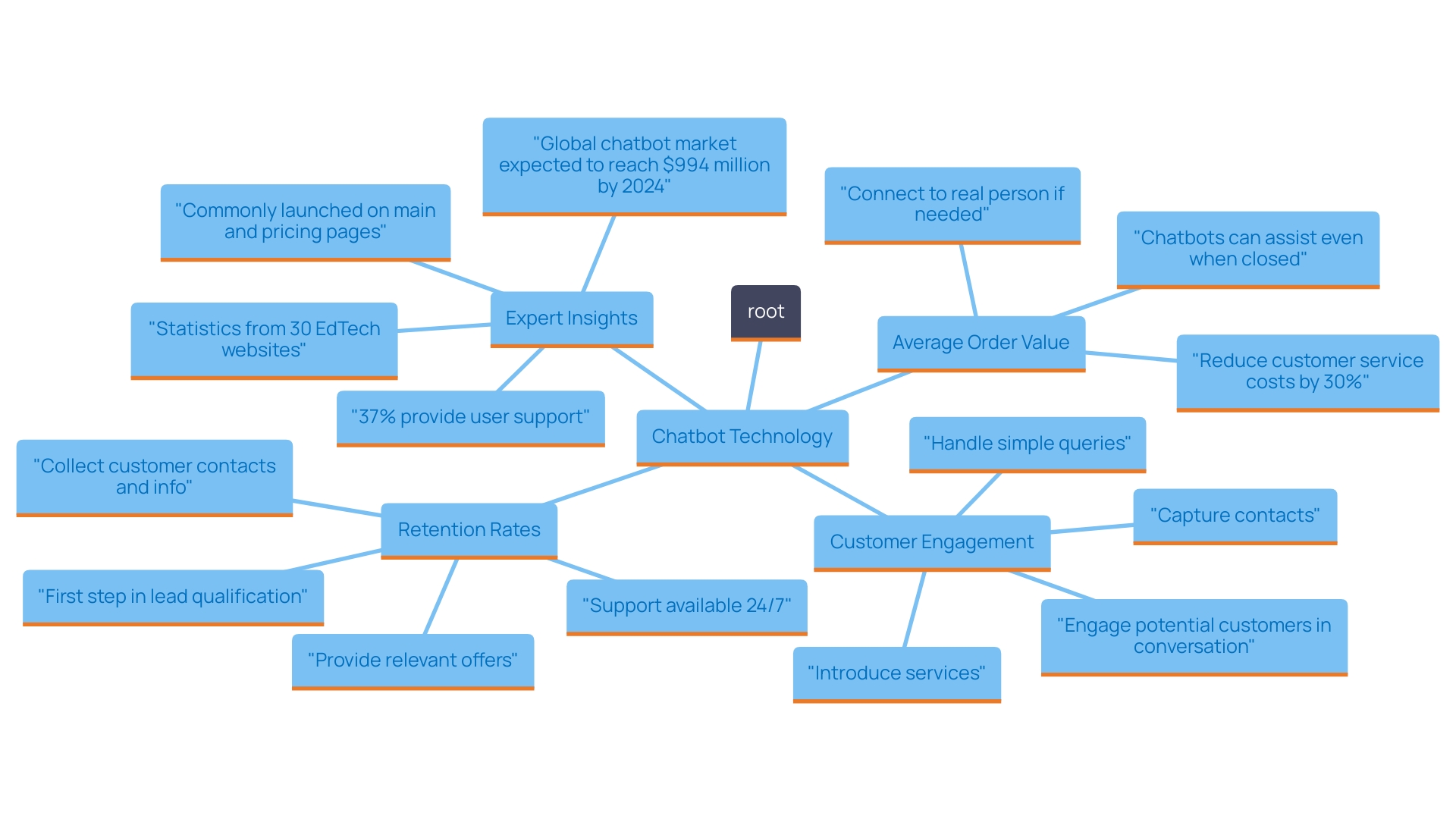
Conclusion
The integration of AI-powered chatbots into the e-commerce sector marks a significant shift in how retailers engage with their customers. These sophisticated tools not only provide personalized shopping experiences through tailored product recommendations but also ensure immediate customer support, addressing the need for convenience in today's fast-paced marketplace. As evidenced by case studies from leading brands like Sephora and H&M, successful implementations of chatbots have resulted in enhanced customer satisfaction, increased conversion rates, and improved key performance indicators such as retention rates and Average Order Value.
Despite the remarkable benefits, challenges remain, particularly regarding customer frustrations with the transition to human agents. However, businesses can mitigate these issues by leveraging user data more effectively, ensuring a smoother customer journey. The advancements in natural language processing and machine learning have further empowered chatbots, allowing them to predict customer needs and deliver tailored experiences that resonate with individual preferences.
As the landscape of e-commerce continues to evolve, embracing chatbot technology is no longer just an option but a necessity for retailers aiming to thrive. By prioritizing personalized interactions and maintaining a focus on community value, businesses can foster long-term customer loyalty and drive significant growth. The future of shopping lies in the seamless integration of technology and human touch, paving the way for a more engaging and efficient retail experience.





